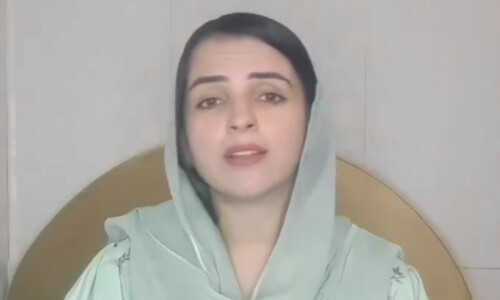ISLAMABAD, Dec 1: Several essential medicines are out of market ostensibly because of an artificial shortage created by their multinational manufacturers in a bid to extract maximum concessions from the government ahead of finalisation of its drug pricing policy.
The crisis is being described by some people in medical circles as the worst in recent years because even some of the most common medicines like Panadol have disappeared from chemists’ shelves across the country, and stocks of several prescription drugs manufactured by multinationals in different parts of the country have rapidly depleted. Included among these are Augmentin and Wymox capsules, Mucaine syrup, Ventolin inhaler, Actifed, Betnovate-N cream, Polyfax ointments (skin & eye), Pyodine, Polycrol syrup, Gaviscone syrup, Angisid tablets, Thyroxine, Atem inhaler, Neomercazole, Cicatrin power, Distalgesic tablets, Septran syrup, Amoxil capsules and Buscopan, Maxolon, and Gravinate tablets. The list is by no means exhaustive.
Most of these drugs are on WHO’s list of essential medicines.
Salespersons in Islamabad’s leading chemist stores confirmed that most of the drugs had been short in supply for sometime. Mr M. Fazal of the Shaheen Chemists said the drugs had been either in short supply or not available at all.
Mohammad Hussain, who works at the D. Watson Chemists, said the shortage had been there for quite a few weeks.
Sources in the pharmaceutical industry indicated that it was an artificial shortage created by manufacturers in anticipation of a new official pricing formula for medicines. The new formula is expected to be announced by the end of this month and is likely to significantly raise prices.
According to sources, some multinational companies have slowed down production and it was a pre-planned shortage.
The companies, a senior health ministry official said, were eyeing a massive 35 per cent hike in prices.
Former Pharma Bureau chief Jeurgen Konig had indicated in an interview with Dawn in June that the multinational companies might cut the supply of their products if they did not get a price hike from the health ministry.
There has been no official increase in the prices of drugs since December, 2001.
However, despite regulatory restrictions local pharmaceutical companies have on a number of occasions enhanced prices of their products. The last raise of some 5 per cent was made late last month.
The tactics of multinational companies have already started yielding desired results.
Health Ministry’s Director General Dr Rashid Juma told Dawn that the new formula would provide ‘relief’ on the old registered drugs of multinational companies.
Qaiser Waheed, one of the leaders of the Pakistan Pharmaceutical Manufacturers Association, an umbrella organisation of local manufacturers, says that the situation has aggravated because of excessive reliance by doctors on drugs produced by multinationals.















































Dear visitor, the comments section is undergoing an overhaul and will return soon.